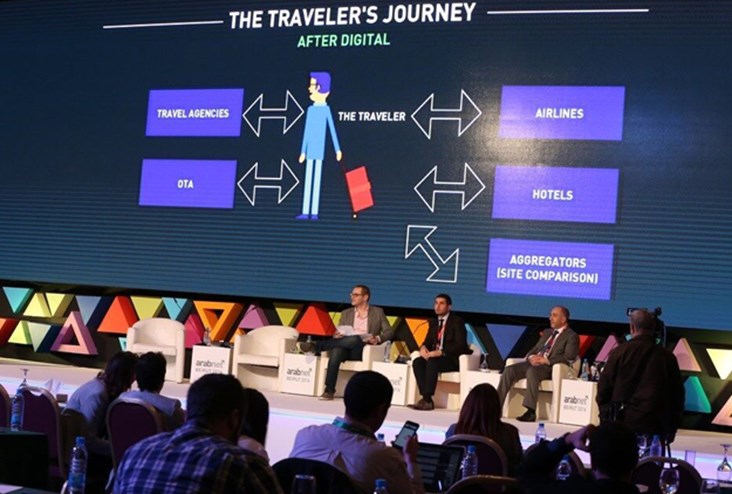
It took established tourism travel agencies and even airlines over a decade to start proposing online booking services for flights, hotels, cars, etc.
The new breed of online agencies can achieve this in a fortnight thanks to their tech-ready, lean, and online-first models – what is referred to as Uberization or Airbnbization.
“There is no chain today; the industry has put the traveler in the middle of a constellation that includes airlines, hotels, aggregators and travel agencies. Today everyone goes onto Expedia,” said Selim Boutros, Director of Kurban Group and Kurban Travel.
But that doesn’t spell the end for non-millennial agencies. At ArabNet Beirut 2016, Boutros and Raja Kurban, Managing Director of the Avis Budget Group at Kurban Travel, drew on the story of their own group to illustrate the opportunities in the digital age.
Specialization and Diversification Is a Must
Kurban Group understood this early on. The company has been growing and diversifying since it was founded in 1952. It introduced car rental services as early as 1962, and after the Civil War, it introduced cab rental services to Lebanon with Allo Taxi in 1999.
In 2010, the company branched out to e-travel , and one year ago it revealed the latest addition to its family, GoKurban, the first Lebanese website for online travel.
“Specialization allowed us to survive,” Boutros said, listing Kurban MGE (Meeting Group & Events), Kurban Corporate, Kurban Leisure, and GoKurban as the group’s key pillars.
“We are heading towards a travel consultancy model,” he added.
Flight Booking Embraces Digital
World Bank figures for air transport reveal a steady increase for Lebanon between 2011 and 2014. Offline sales volumes of outgoing tickets to Lebanon amounts to $560 million per year on average. Estimated online sales figures range between $80-100 million. This figure is significant if one considers the low costs associated with e-sales.
When it comes to corporate clients, bookings still tend to be completed offline. Nonetheless, Kurban counts five big corporate clients and sees the trend of corporate online bookings growing in the region.
GoKurban was the group’s response to these developments.
“Communication channels are mainly digital, and budget is shifting to digital communication channels,” said Boutros.
“We’ve developed a system whereby payment approvals can be done over the phone, and which includes auto invoicing. This process saves clients up to 20% in costs they would incure with offline bookings,” he added.
Car Rentals in the Age of Uberization
Although the motorized transport industry has seen significant changes, notably with the advent of Uber and Careem, Kurban Travel’s Allo Taxi and Allo Bus have not felt the ripples.
“Uber and Careem are not competitors for Allo Taxi because they are not in the same business. They are the booking.com of the taxi company,” said Kurban, implying that clients favor personalization and quality over mass aggregated offerings.
Allo Taxi came from a need of quality cars and services, he explained. He pointed out that the company’s call center still played a big role for many people. “With Uber, if you have a problem while waiting for your taxi, there is no one you can call and talk to.”
“Uber doesn’t have enough cars to sustain their market share. Business has gone up since Uber came into the market. The volume of bookings for Allo Taxi has increased. We introduced our application just before Uber. You can book your vehicle three months in advance, with a choice of six different types of vehicles including a luxury car and a 4x4, and you also have the possibility to pay in cash.”
The Future Is Car Sharing
Referring to trends in other parts of the world, notably Europe, Boutros said they expect similar developments in Lebanon and the region. This would entail a return of the traditional travel agencies who would be better equipped to exploit these trends thanks to their expertise and specialization.
“Regarding travel and transportation, there is today in the Western world, a lesser attachment to property, people buy less cars and depend more on taxis or limos, or car sharing,” said Boutros. The group’s two car rental service, Avis Rent a Car and Budget Rent a Car, have already begun car sharing, and they have tested the Zipcar in the region (in Istanbul where car sharing started in 2012). You can locate a car with your smart phone.”
See related:
Travelstart Localizes Online Travel Booking in the MENA
Hot Trends in Online Travel Booking - Interview with Destinia
Latest Business
Intelligence Report














